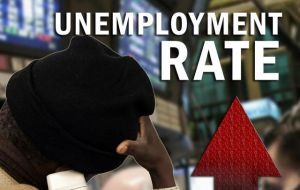MercoPress. South Atlantic News Agency
OECD warns of 25 million jobless in industrialized countries
 Unemployment rate is the highest since World War II
Unemployment rate is the highest since World War II The Organisation for Economic Co-operation and Development (OECD) says the global recession could cost 25 million people their jobs. This is despite recent signs that economies of its 30 member countries may be starting to recover.
This is despite recent signs that economies of its 30 member countries may be starting to recover.
“A recovery is in sight, but it is likely to be modest for some time to come,” OECD chief Angel Gurria said.
Fifteen million jobs have been lost so far, and up to 10 million more could go by the end of 2010, the OECD said.
The unemployment rate across the 30 most industrialised nations in the OECD was 8.5% for July, the highest since World War II. It was 5.6% at the end of 2007.
The group said that the rate could reach a new high of 10% by the end of next year, with 57 million people out of work, if the recovery fails to gain momentum.
“We've thrown trillions and trillions and trillions at [the problem] and of course we're seeing results,” said Mr Gurria, the OECD secretary general, referring to global stimulus efforts.
“Employment is the bottom line of the current crisis. We should not assume that growth will take care of this.”
Spain, the Irish Republic and the US were worst hit in the OECD, with unemployment rates rising by 9.7 percentage points, 7.8 percentage points and 4.5 percentage points respectively between the start of 2007 and July this year, the OECD said.
“As in previous severe economic downturns, vulnerable groups - youth, immigrants and workers in temporary or part-time jobs - are bearing most of the brunt of the job losses,” Mr Gurria said.
The OECD recently said the economies of its members stabilised in the last quarter.
While Japan, France and Germany are some of the economies to show economic growth in the second quarter, latest figures showed countries such as the US and UK were still shrinking.




Top Comments
Disclaimer & comment rulesCommenting for this story is now closed.
If you have a Facebook account, become a fan and comment on our Facebook Page!